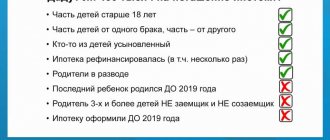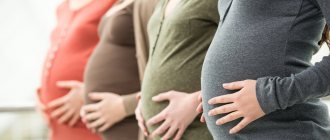Russian legislation on single mothers
Until recently, in domestic legislation there was no such thing as a “single mother” and no clear definition of who could be classified in this category.
In 2014, a resolution was adopted by the Supreme Court of the Russian Federation, according to which a single mother should be understood as a woman who independently fulfills parental responsibilities for the upbringing and development of one or more children without the help of their father or stepfather.
State support for such women is provided at different levels and in different areas. Some benefits are prescribed, for example, in the Labor and Tax Codes of the Russian Federation.
In addition to federal payments, regional regulations may provide for the availability of additional monetary assistance in a certain territory.
What is required by law for a single mother?
In general, we can say that the law requires single mothers to receive the same payments as women in a two-parent family:
- payment at the birth of a child;
- benefits related to pregnancy and childbirth;
- child care allowance until the child reaches 1.5 years of age.
Federal payments are not all that a single woman who gives birth to a child is entitled to. For example, the Moscow Government has determined compensation payments for this category of the population:
- related to the rising cost of living for children under 16 years of age;
- tied to rising food prices for children under 3 years of age;
- in the case of a single mother caring for a disabled child.
In addition, if a woman’s income is below the subsistence level, state assistance for child care is not the only thing she is entitled to by law. She is also entitled to other payments, the amount of which depends on the age of the child.
State assistance measures for single mothers with many children
If a single woman is raising several minor children at once, she can count on additional help:
- a one-time payment of 14 thousand rubles in the case of the birth of a third baby, 50 thousand rubles for the birth of triplets (a young mother under 35 years old will be paid 48 thousand rubles for each newborn);
- monthly reimbursement of payment for the telephone in the amount of 230 rubles;
- an annual allowance for the purchase of school uniforms in the amount of 5 thousand rubles.
What benefits are available to single mothers?
All child benefits for single mothers in 2021 can be divided into two large groups:
- those that are paid in a lump sum;
- those that are accrued monthly until the child reaches a certain age.
In addition, the amount of payments depends on the number of children in the family and the order of birth of a particular child, as well as on whether the woman works or not.
There are federal and regional benefits. The former are due to all citizens of Russia, and the latter – only to residents of a certain region.
As practice shows, payments at different levels differ significantly from each other. But in any case, single mothers should be under special protection of the state.
One-time payments
Already from the name it is clear that lump sum payments do not have a regular basis, but are transferred only once. Thus, a single mother, along with other women giving birth, is entitled to financial assistance from the state after childbirth.
Each child is entitled to a separate payment. From February 1, 2021, its size is 18,143.96 rubles. This amount is the same for everyone and does not depend on the woman’s employment, her income level and other factors.
You must contact your employer (for workers) or social security authorities (for non-working citizens) to request payment within six months after the birth of the baby.
In the regions, an additional one-time payment is often provided: for example, in Moscow it is currently 5,500 rubles. at the birth of the first child and 14,500 rubles. for the second and all subsequent ones.
Monthly benefits
Monthly payments are assigned to a young mother and are paid every month until the child reaches 1.5 years of age. The amount of benefit for a working mother is 40% of the average earnings for the previous 2 years of pregnancy, but not more than 27,984.66 rubles. and not less than 5036 rubles. for the first child (after indexation from 1.02.20). The amount of benefit for the second and subsequent ones is no more than 27,984.66 rubles. and not less than 6803.9 rubles.
The minimum amount of child support up to one and a half years for a mother who did not work before his birth is 5,036 rubles for the first child and 6,803.9 rubles for the second.
As we can see, benefits are paid to both officially employed women and those who did not work. Employees need to contact their employer to apply for one. In this case, the payment is made by the Social Insurance Fund.
For unemployed citizens, this payment is issued and paid monthly after contacting the social protection authorities at the place of residence.
From the beginning of 2021, young families with a monthly income of less than 1.5 subsistence minimums have the opportunity to receive new payments for children under 3 years of age. These are targeted benefits in the amount of the subsistence minimum established in a certain region.
Women often go on maternity leave not for one and a half years, but for three. It is logical that during this time they must somehow provide for themselves and the child. But, according to the law, the above amounts are paid only for the first 1.5 years, and the amount of benefits for up to 3 years in the Russian Federation will be only 50 rubles for the remaining period. per month.
Targeted payments are available only to those whose child was born or adopted since January 1, 2021.
Payments to employed women
Maternity benefits (so-called maternity benefits) are paid exclusively to women. After 30 weeks of pregnancy, the antenatal clinic issues them a certificate of incapacity for work, after which the working expectant mother receives payments in the amount of her average monthly earnings.
In 2021, the maximum benefit amount is 322,190 rubles, the minimum benefit is 55,830 rubles.
In addition, she should receive:
- allowance for registration in the early stages of pregnancy – 680 rubles;
- one-time benefit for the birth of a child – 18,143.96 rubles;
- monthly child care allowance – minimum 5036 rubles. and a maximum of 27,984.66 rubles.
- monthly allowance for child care up to 3 years old - the amount depends on the region;
- maternity capital – 466,617 rubles. (+ 150 thousand if the child is the second or subsequent).
Payments for unemployed people
It happens that a woman does not work either before or during pregnancy. In this case, all payments to her are:
- are charged in a minimum or clearly established amount;
- are paid through the social protection authorities.
Payments due at the birth of a second child
We have figured out what payments are due at the birth of the first child. However, many families have more children. According to Russian legislation, upon the birth of a second child, the same payments and benefits are provided as during pregnancy and the birth of the first child. Only the payment amounts differ. For example, the minimum amount of benefits for caring for a second child until he reaches the age of 1.5 years is already 6803.9 rubles, which is more than the minimum for the first.
Under any circumstances, raising and raising two children is much more difficult than one, especially if you do it alone. Therefore, the state guarantees additional assistance to single mothers - monthly payments for the second child are much higher than for the first.
In addition, from 2020, when issuing a certificate for maternity capital at the birth of a second or subsequent child, its amount will be increased by 150 thousand rubles.
Many regions of the country encourage the birth of two or more children, also increasing the amount of benefits.
Payments to mothers of many children
If a woman has three or more children, she is considered a mother of many children. In addition to the payments provided for other children, a mother with many children will receive:
- a monthly payment for the third child until he reaches the age of three in the amount of the child’s subsistence minimum established by law;
- regional maternity capital.
Having received the status of a woman with many children, she will be able to count on additional benefits and benefits, which differ in each region.
The subsidy for the third child is paid together with the maternity capital provided under the program for the second child. To find out about the required benefits and benefits, you should contact the social protection authority.
Benefits for low-income single mothers
Families in which the income per person is less than the minimum subsistence level established by law are considered low-income.
This happens to single mothers because, due to raising a child on their own, they do not work or are forced to limit themselves to part-time work. This phenomenon is especially common if there are several children in the family.
To ensure that their lives meet the minimum standard, low-income families are paid a monthly additional child benefit.
Although this payment is considered federal, its amount is set at the local level and differs in different regions. In many territories, such assistance for single mothers is provided at an increased rate.
Housing programs for single mothers in 2021
Some regions, covering partial loan costs, provide apartments from developers involved in the construction of budget housing. Social mortgage programs operate in many cities.
Housing program
The social program “Housing”, the subprogram “Young Family” allows single mothers to realize their right to housing. To take part you must:
- be no older than 35 years old;
- be placed on a waiting list to receive or improve living space;
- have solvency.
Single mothers whose expenses for housing and utilities exceed the norm established in the region will be compensated for the specified payments. To assign a benefit, you should contact the territorial department of social protection to assign subsidies for housing and communal services.
Download for viewing and printing:
Decree of the Government of the Russian Federation of December 17, 2010 No. 1050 Moscow “On the federal target program “Housing”
Attention! If you earn enough money, rent is not paid, and there is also no compensation for low-income mothers who are not registered.
Mortgage
The next way is to obtain a housing loan under a preferential program.
A single mother may have:
- subsidy for payment of the first installment;
- state assistance in interest payments;
- financial compensation or partial loan repayment;
- easier lending conditions.
Bank offers
Social mortgages are offered by banks. For example, Sberbank has a “Young Family” program.
Banks can:
- grant a deferment on loan repayment for three years;
- reduce the interest rate;
- Additionally, relatives can be involved as borrowers.
Other payments to single mothers
The state also provides other assistance for single mothers, for example, compensation for baby food. It is paid until the child reaches three years of age. In Moscow, there are compensations for renting housing if a woman is registered as in need of improved housing conditions.
Single mothers who register with a medical organization before the 12th week of pregnancy are entitled to an additional payment of 680 rubles. monthly.
A woman can not only give birth, but also adopt a child. To do this, all necessary conditions must be met. Those who decide to take such a responsible step are entitled to cash payments in the same way as those who give birth to a baby.
A special case is considered if a single mother is raising a disabled child. Then certain allowances are provided for her under various regional programs. And if a single mother is also disabled herself, she is paid an increased pension.
Other life circumstances also force women to think about whether or not they have the right to government assistance.
For example, pregnancy occurred in a girl who is still studying or is in military service. Formally, she is not employed, but will still receive maternity benefits in a fixed amount.
For example, when determining what a student is entitled to, the calculation will take the amount of her scholarship, and for a military woman - state care.
Getting housing on credit
A woman raising a child herself must, like other borrowers, submit documents to the financial institution confirming her solvency. If she has several dependent children or other disabled relatives, then the likelihood of a positive decision on the application decreases. When there is doubt about the sufficiency of income to pay the loan, you can try to reduce the mortgage amount, which will increase the chance of the bank making a positive decision on the loan.
The main condition for a bank to provide a loan is the availability of sources of income, which must be confirmed by relevant certificates. When considering a loan application, main and additional income are considered. If a woman has working relatives, they can become guarantors or co-borrowers. Having other real estate or a car can increase the likelihood of getting a mortgage.
If you have a stable income and a positive credit history, you should not refuse to purchase an apartment on credit.
It is worth finding out more information about existing programs, loan conditions and submitting an application. And, perhaps, after some time, the pipe dream of owning your own apartment will come true.
Benefits for single mothers
Taking care of single mothers, the state provides various benefits.
First of all, a large number of benefits are prescribed in labor legislation. They relate to the daily routine, dismissal and hiring, sick leave and many other aspects.
The Tax Code of the Russian Federation specifies some tax deductions, including for this category of mothers:
- for the first two children – 2,800 rubles each (double deduction);
- for the third and subsequent ones – 6,000 rubles;
- for a disabled child – 24,000 rubles.
Thus, single mothers are not subject to personal income tax on one-time targeted payments.
Other benefits are provided for single mothers:
- free meals in educational institutions;
- priority right to place children in preschool institutions;
- free medicines and medical services, trips to a sanatorium;
- free travel by public transport and others.
These types of benefits are usually established at the regional level.
How to apply for benefits
If she has a registered status as a single mother, a woman can apply for appropriate benefits.
The answer to the question of how to receive a particular payment may differ depending on the organization that assigns it.
Where to contact
As noted earlier, depending on the type of benefit, you need to collect a certain package of documents for the employer or social protection authorities at the place of residence.
Required documents
The complete list of documents depends on the organization you apply to to receive benefits. You will need:
- passport;
- child's birth certificate;
- certificate of family composition;
- work book (if available);
- certificate No. 25 (issued at the registry office).
To receive any payment, you must submit an application.
How to confirm your single mother status?
When a woman who is not married applies to the registry office, the baby is registered in accordance with the information provided by the mother. To carry out such a recording, it is necessary that there is no statement from both parents, as well as a court decision establishing paternity.
You can obtain this status in the following cases:
- A woman became a mother without being in a marriage union. Paternity was not established.
- If the baby was born 300 days after the divorce, then this gives the right to help from the state.
- Adopt a child without being married.
- The certificate contains a record of paternity. This was disputed in court, and a decision was obtained confirming that this person was not the father of the child.
To confirm the status of a single mother, a certificate of form No. 25 is issued, which is obtained from the registry office if there is no information about the father of the newborn. If the mother is in a civil marriage, then this circumstance is not taken into account.
If a family does not register their relationship, but lives together, the mother can take advantage of benefits. The amount of benefits does not affect whether the father’s name is written on the birth certificate according to the woman’s words, or whether there is a dash there.
Up to what age are benefits paid?
Many single mothers are interested in the age up to which money is paid in Russia. Let us remind you that all women are required to receive benefits until the child reaches one and a half years of age.
Officially employed women have more rights, since they are forced to take maternity leave and take a break from work. In this regard, they are paid benefits until the child reaches the age of three.
After 3 years, payments are provided mainly to the poor, as well as to those raising a disabled child.
If the family's monthly income is below the minimum subsistence level established by the state, then, in accordance with regional laws, benefits may be awarded that are paid until the child reaches 18 years of age.
Amount and types of payments
Benefits approved at the federal level are similar for two-parent and single-parent families. The status of “single mother” will not be a reason to pay a large amount. Exceptions are possible at the regional level. Local authorities set the amount of payments on an individual basis based on current regulations. A number of circumstances can affect the amount of the benefit:
- number of dependents on support;
- availability of official employment;
- monthly family income;
- carrying out work during pregnancy.
The voiced points can change the amount of the benefit. It is enough for a woman to provide authorized persons with documentary evidence of the circumstances.
There are several payment options available to single mothers. Each of them is provided for a specific purpose. The following list will help you get acquainted with the conditions for receiving:
- Funds provided to pregnant women. The amount of payment depends on the course of pregnancy and the severity of childbirth.
- One-time payment on the occasion of the birth of a child.
- State assistance provided to pregnant women in the early stages.
- Benefit provided to mothers after childbirth.
- Monthly payments until the child reaches 3 years of age.
- Regional subsidies for low-income mothers raising minor dependents.
- Additional assistance in connection with the birth of 2 and subsequent children. The calculation takes into account the subsistence level (LS) of the locality.
- Maternity capital allocated by the state to improve the living conditions of the family.
Some of the announced subsidies become relevant when the first child is born or in the process of bearing it. The remaining payments are intended for mothers who gave birth to 2 or more children. To avoid losing money due to the expired deadline for submitting documents, it is recommended that you familiarize yourself with all the points in advance.
Payments upon birth of a child by an employed mother
The state stimulates the birth rate by allocating funds to “newly made” mothers. The “single” status does not affect the situation. The list of types of benefits provided to women upon the birth of their first child is given in the table:
| Type of payment | Sum |
| Subsidy provided as compensation for pregnancy and childbirth | The basic payment amount is 34 thousand 530 rubles. 100% of the salary is compensated, but not less than the stated amount. The calculation is carried out from the 7th month of pregnancy until the 70th day after the birth of the child. |
| One-time transfer of funds in early pregnancy | 613 rub. |
| Payment in connection with the birth of the first child | 16 thousand 350 rub. |
| Monthly allowance for the maintenance of a dependent (up to the age of three) | The payment will be 40% of the mother’s income up to 1.5 years and 50% up to 3 years. The amount cannot be less than 3 thousand rubles. |
| State assistance to low-income families with minor children | Varies by region. |
| Additional payment provided to mothers, according to the decree of the head of state dated November 28, 2021 | Approximately 10 thousand rubles are allocated. The amount is tied to the minimum wage of the region, so it may be different. |
Payments are relevant for working women. In the case of the birth of 2 or subsequent children, new subsidies are added to the list. The general list of compensation for single mothers with many children is presented in the table:
| Subsidy type | Sum |
| Monthly payment for the birth of a second child | 40% of income, but not less than 6 thousand rubles. Payments continue for up to 1.5 years. |
| Maternal capital | 453 thousand are provided one-time for the purchase of living space. Additional payments to maternity capital are possible and are established by the constituent entities of the Russian Federation. |
| Payment for 3 children | Set at the regional level. |
Subsidies for unemployed mothers
Employers do not have the right to fire employed pregnant women at will. The rights of expectant mothers are protected by Article 261. Labor Code of the Russian Federation. The situation is different when trying to find a job while pregnant. The probability of finding a suitable vacancy is virtually zero. Women can only count on a few payments allocated in a fixed amount by the social protection authorities at their place of registration:
- One-time payment after the birth of the first child.
- Monthly benefit until the child reaches 1.5 years of age.
- Funds provided by the state to low-income families (one-parent, one-parent) with minor children.
- Maternal capital. The certificate can be used when the second or subsequent child reaches 3 years of age.
- Subsidies allocated monthly until the age of 3 children. The amount of payments is set at the regional level.
A non-working single mother will in any case receive a payment after childbirth, an allowance until the child reaches 18 months, and maternity capital if she has 2 or more children. Other subsidies may not be relevant due to budget constraints.
Prospects for increasing payments
Every year the state predicts an increase in payments and an increase in guarantees in the social sphere. This is done in order to ensure a decent standard of living for those categories of the population that need social assistance and protection.
At the end of last year, the government indexed many payments in connection with inflation. This determines whether certain benefits will increase. Compared to the previous year, all social payments, including those for single mothers, should increase by 3%.
Grounds for termination of payments
Benefits cease to be paid when the grounds for their assignment are eliminated. Local authorities may set reasons why benefits will be denied. For example, the Moscow Government decided that the legal basis for termination of monthly child benefits is:
- the child reaches a certain age;
- deregistration at his place of residence in Moscow;
- exceeding the average monthly family income;
- death of a child.
When determining how much money a single woman with a child should now receive per month, the capital authorities also decided that payments could be suspended if:
- benefits have not been received for 6 consecutive months;
- a legal court decision by which the child is declared missing comes into force;
- a minor works under an employment contract or is engaged in entrepreneurial activity, as a result of which he becomes fully capable.
Other regions may have different termination rules.
Answers to common questions
Question No. 1. Where is the money transferred after the application for government benefits in Moscow is approved?
The amounts of all state benefits are credited to the Muscovite’s social card.
Question No. 2. When should documents be submitted for the assignment of Moscow social benefits for children to single mothers?
Some payments must be made before the child is 6 months old, others - up to 12 months. The general recommendation is that you should not apply for benefits if the crediting of funds to the account begins in the last months of maternity leave, otherwise the B&R benefit will be taken into account when calculating family income, which will lead to a reduction in the amount of payments or a refusal to assign them .
Payments to single mothers in 2021 in Moscow
In the capital, unlike other regions of the Russian Federation, single mothers can receive payments intended only for them:
- monthly allowance in the amount of 15 thousand rubles for a child under 3 years old and 6 thousand rubles. — for a child from 3 to 6 years old or 12 thousand rubles. — for a disabled child under 18 or 23 years old;
- monthly payments to compensate for inflation for food for a child under 3 years old - 675 rubles and for other expenses for children under 16 or 18 years old - 750 rubles.
To receive these payments, a single mother must have permanent registration in Moscow.








